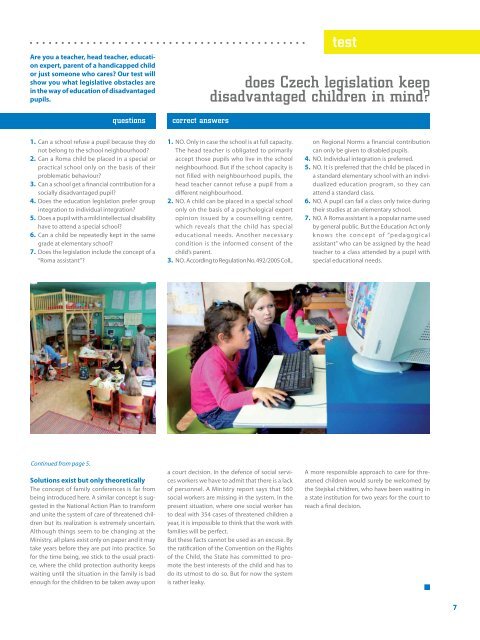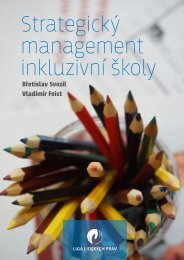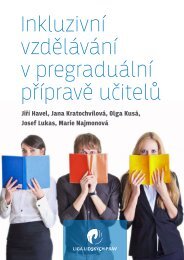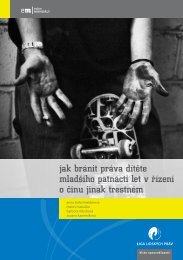EXTRA league papers | issue 3 | winter 2010 | What Schools Do We Want for our Children?
You also want an ePaper? Increase the reach of your titles
YUMPU automatically turns print PDFs into web optimized ePapers that Google loves.
Are you a teacher, head teacher, education<br />
expert, parent of a handicapped child<br />
or just someone who cares? Our test will<br />
show you what legislative obstacles are<br />
in the way of education of disadvantaged<br />
pupils.<br />
questions<br />
1. Can a school refuse a pupil because they do<br />
not belong to the school neighb<strong>our</strong>hood?<br />
2. Can a Roma child be placed in a special or<br />
practical school only on the basis of their<br />
problematic behavi<strong>our</strong>?<br />
3. Can a school get a fi nancial contribution <strong>for</strong> a<br />
socially disadvantaged pupil?<br />
4. <strong>Do</strong>es the education legislation prefer group<br />
integration to individual integration?<br />
5. <strong>Do</strong>es a pupil with a mild intellectual disability<br />
have to attend a special school?<br />
6. Can a child be repeatedly kept in the same<br />
grade at elementary school?<br />
7. <strong>Do</strong>es the legislation include the concept of a<br />
“Roma assistant”?<br />
Continued from page 5.<br />
Solutions exist but only theoretically<br />
The concept of family conferences is far from<br />
being introduced here. A similar concept is suggested<br />
in the National Action Plan to trans<strong>for</strong>m<br />
and unite the system of care of threatened children<br />
but its realization is extremely uncertain.<br />
Although things seem to be changing at the<br />
Ministry, all plans exist only on paper and it may<br />
take years be<strong>for</strong>e they are put into practice. So<br />
<strong>for</strong> the time being, we stick to the usual practice,<br />
where the child protection authority keeps<br />
waiting until the situation in the family is bad<br />
enough <strong>for</strong> the children to be taken away upon<br />
correct answers<br />
1. NO. Only in case the school is at full capacity.<br />
The head teacher is obligated to primarily<br />
accept those pupils who live in the school<br />
neighb<strong>our</strong>hood. But if the school capacity is<br />
not filled with neighb<strong>our</strong>hood pupils, the<br />
head teacher cannot refuse a pupil from a<br />
diff erent neighb<strong>our</strong>hood.<br />
2. NO. A child can be placed in a special school<br />
only on the basis of a psychological expert<br />
opinion <strong>issue</strong>d by a counselling centre,<br />
which reveals that the child has special<br />
educational needs. Another necessary<br />
condition is the in<strong>for</strong>med consent of the<br />
child’s parent.<br />
3. NO. According to Regulation No. 492/2005 Coll.,<br />
test<br />
does Czech legislation keep<br />
disadvantaged children in mind?<br />
a c<strong>our</strong>t decision. In the defence of social services<br />
workers we have to admit that there is a lack<br />
of personnel. A Ministry report says that 560<br />
social workers are missing in the system. In the<br />
present situation, where one social worker has<br />
to deal with 354 cases of threatened children a<br />
year, it is impossible to think that the work with<br />
families will be perfect.<br />
But these facts cannot be used as an excuse. By<br />
the ratifi cation of the Convention on the Rights<br />
of the Child, the State has committed to promote<br />
the best interests of the child and has to<br />
do its utmost to do so. But <strong>for</strong> now the system<br />
is rather leaky.<br />
on Regional Norms a financial contribution<br />
can only be given to disabled pupils.<br />
4. NO. Individual integration is preferred.<br />
5. NO. It is preferred that the child be placed in<br />
a standard elementary school with an individualized<br />
education program, so they can<br />
attend a standard class.<br />
6. NO. A pupil can fail a class only twice during<br />
their studies at an elementary school.<br />
7. NO. A Roma assistant is a popular name used<br />
by general public. But the Education Act only<br />
knows the concept of “pedagogical<br />
assistant” who can be assigned by the head<br />
teacher to a class attended by a pupil with<br />
special educational needs.<br />
A more responsible approach to care <strong>for</strong> threatened<br />
children would surely be welcomed by<br />
the Stejskal children, who have been waiting in<br />
a state institution <strong>for</strong> two years <strong>for</strong> the c<strong>our</strong>t to<br />
reach a fi nal decision.<br />
7

















